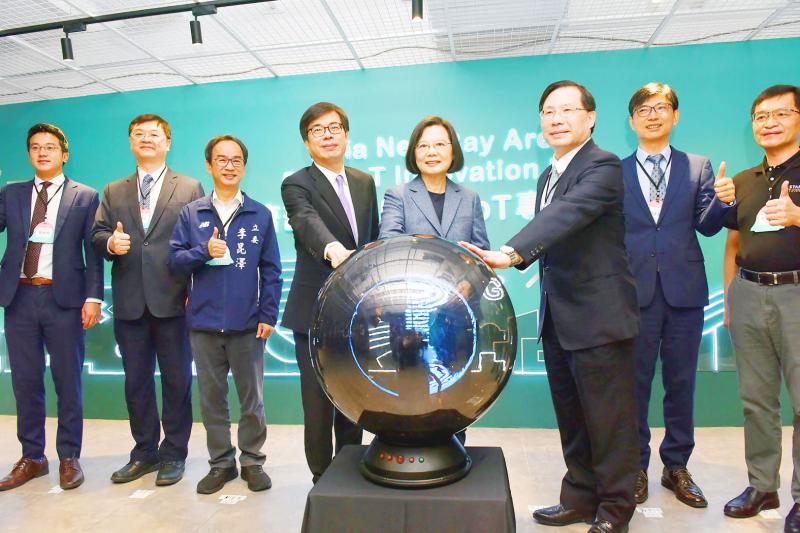The government yesterday inaugurated the program office for a 5G artificial intelligence of things (AIoT) innovation park in Kaohsiung’s Asia New Bay Area (亞洲新灣區).
The 5G AIoT Innovation Park Program Office is to oversee the construction of Taiwan’s most comprehensive 5G and AIoT testing and demonstration facilities, and an innovation park for start-ups.
The five-year, NT$11 billion (US$396.5 million) investment plan, which was announced early this year by the Executive Yuan, involves the Kaohsiung City Government, the Ministry of Economic Affairs, the Ministry of Transportation and Communications, the National Development Council, the National Communications Commission and the Ministry of Culture.

Photo courtesy of the Ministry of Economic Affairs
The government has so far attracted 42 local and foreign start-ups — including InSynerger Technology Co (思納捷科技), Dudoo Ltd (肚肚), Pumpkin Studio (南瓜虛擬科技), Nadi System Corp (杰悉科技) and Uniigym Co (優力勁聯) — to join the innovation park, the Ministry of Economic Affairs said in a statement.
The government hopes to build a complete entrepreneurial environment with ample resources at the park to help start-ups expand their markets and align with international trends, it said.
In addition, several start-up accelerators and local companies, as well as some international corporations, such as Amazon Web Services, Microsoft Corp and Nvidia Corp, have expressed an interest in having a presence at the innovation park, Vice Minister of Economic Affairs Lin Chuan-neng (林全能) said.
The Asia New Bay Area investment plan would also promote music centers, conferences and exhibitions, as well as e-sports and logistics development in Kaohsiung, the Ministry of Economic Affairs said.
President Tsai Ing-wen (蔡英文) was briefed by the city government and several ministries about the investment plan earlier yesterday at the inauguration ceremony.
The program office would play an important role in the government’s efforts to balance development between southern and northern Taiwan, Tsai said.
It is a starting point for Kaohsiung’s digital transformation, and represents a close collaboration between the central and local governments, she said.
Tsai added that she expects the investment plan to help Kaohsiung develop into a new technology center, create more high-quality work opportunities for young people in the south, and lead to a new phase of industrial and economic development in the nation.
At the ceremony, Kaohsiung Mayor Chen Chi-mai (陳其邁) thanked the central government for supporting high-tech development in the Asia New Bay Area through the 5G, AIoT, information technology and digital sectors, and praised the close collaboration between various ministries and the city government that enabled the program office to start operations 10 months after its initiation.
In addition, a newly developed science park in Kaohsiung’s Ciaotou District (橋頭) would soon allow manufacturers to start choosing sites and build factories, Chen said, adding that several international companies would be joining the park.

SEMICONDUCTORS: The German laser and plasma generator company will expand its local services as its specialized offerings support Taiwan’s semiconductor industries Trumpf SE + Co KG, a global leader in supplying laser technology and plasma generators used in chip production, is expanding its investments in Taiwan in an effort to deeply integrate into the global semiconductor supply chain in the pursuit of growth. The company, headquartered in Ditzingen, Germany, has invested significantly in a newly inaugurated regional technical center for plasma generators in Taoyuan, its latest expansion in Taiwan after being engaged in various industries for more than 25 years. The center, the first of its kind Trumpf built outside Germany, aims to serve customers from Taiwan, Japan, Southeast Asia and South Korea,

POWERING UP: PSUs for AI servers made up about 50% of Delta’s total server PSU revenue during the first three quarters of last year, the company said Power supply and electronic components maker Delta Electronics Inc (台達電) reported record-high revenue of NT$161.61 billion (US$5.11 billion) for last quarter and said it remains positive about this quarter. Last quarter’s figure was up 7.6 percent from the previous quarter and 41.51 percent higher than a year earlier, and largely in line with Yuanta Securities Investment Consulting Co’s (元大投顧) forecast of NT$160 billion. Delta’s annual revenue last year rose 31.76 percent year-on-year to NT$554.89 billion, also a record high for the company. Its strong performance reflected continued demand for high-performance power solutions and advanced liquid-cooling products used in artificial intelligence (AI) data centers,

Gasoline and diesel prices at domestic fuel stations are to fall NT$0.2 per liter this week, down for a second consecutive week, CPC Corp, Taiwan (台灣中油) and Formosa Petrochemical Corp (台塑石化) announced yesterday. Effective today, gasoline prices at CPC and Formosa stations are to drop to NT$26.4, NT$27.9 and NT$29.9 per liter for 92, 95 and 98-octane unleaded gasoline respectively, the companies said in separate statements. The price of premium diesel is to fall to NT$24.8 per liter at CPC stations and NT$24.6 at Formosa pumps, they said. The price adjustments came even as international crude oil prices rose last week, as traders

SIZE MATTERS: TSMC started phasing out 8-inch wafer production last year, while Samsung is more aggressively retiring 8-inch capacity, TrendForce said Chipmakers are expected to raise prices of 8-inch wafers by up to 20 percent this year on concern over supply constraints as major contract chipmakers Taiwan Semiconductor Manufacturing Co (TSMC, 台積電) and Samsung Electronics Co gradually retire less advanced wafer capacity, TrendForce Corp (集邦科技) said yesterday. It is the first significant across-the-board price hike since a global semiconductor correction in 2023, the Taipei-based market researcher said in a report. Global 8-inch wafer capacity slid 0.3 percent year-on-year last year, although 8-inch wafer prices still hovered at relatively stable levels throughout the year, TrendForce said. The downward trend is expected to continue this year,